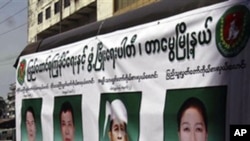Burma's military government is preparing to hold elections Sunday as part of what it says is a plan to return the country to civilian democracy after 50 years of military rule. Critics have condemned the polls, the first since 1990, as designed to keep the military in power. The government has banned outside observers and journalists.
Burma is set to go to the polls Sunday with very little doubt that the military will remain in power.
The constitution guarantees the military a quarter of all seats in parliament and the two biggest parties are made up of former military officers and supporters of military rule.
Moreover, authorities disbanded the main opposition party, the National League for Democracy, which boycotted the elections because of unfair rules.
Watch Daniel Schearf's Report on Burmese Refugees in Thailand
Opposition parties say authorities have been using fraudulent advanced voting and intimidation to ensure their victory.
Khin Ohmar, coordinator of the Burma Partnership coalition promoting democracy, says this is not an election for the people.
"Because this is not even an election at all - it's a selection process. It is a selection process by the military regime to consolidate their power and get the legitimacy through this process, for them to control the country and stay in power forever," said Khin Ohmar.
A splinter group of the NLD, the National Democratic Force, is contesting the elections along with more than 30 smaller parties.
Analysts agree the elections favor the military, but some say they still offer the possibility of progress.
Thitinan Pongsudhirak is director of the Institute of Security and International Studies at Thailand's Chulalongkorn University. He says critics should not dismiss the elections as hopeless.
"What is important is not before the election and the election itself. We know that will be a sham. It will not be a free and fair election," he said. "The rules are rigged… But, what happens after the election, in that process, you could have new space, new opportunities, to proceed with dialogue, with some kind of a movement forward."
The National League for Democracy won Burma's last elections in 1990 but the military ignored the results and has since locked up thousands of political dissidents.
NLD leader Aung San Suu Kyi is still under house arrest and is scheduled to be released just days after the elections.














